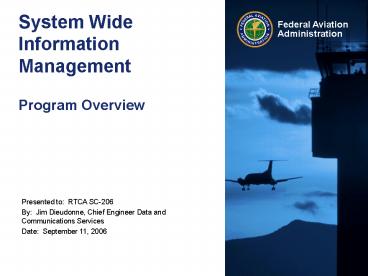System Wide Information Management Program Overview - PowerPoint PPT Presentation
1 / 10
Title:
System Wide Information Management Program Overview
Description:
By: Jim Dieudonne, Chief Engineer Data and Communications Services ... Aeronautical. Information. COI. NAS. Management. COI. SWIM Presentation to RTCA SC-206 ... – PowerPoint PPT presentation
Number of Views:25
Avg rating:3.0/5.0
Title: System Wide Information Management Program Overview
1
System Wide Information Management Program
Overview
Presented to RTCA SC-206 By Jim Dieudonne,
Chief Engineer Data and Communications
Services Date September 11, 2006
2
SWIM Contacts
- Program Manager
- Don Ward, Donald.Ward_at_faa.gov
- Systems Engineer Lead
- Mike Hritz, Mike.Hritz_at_faa.gov
3
Business as Usual
What is SWIM?
- More point-to-point unique interfaces - Costly
development, test, maintenance, CM - New
decisions linked to old data constructs -
Cumbersome data access outside of NAS
Today
Enterprise Management
- Fewer open, COTS-based, secure, access points
for new systems and external data customers -
Reduced development, test, maintenance, CM -
Decisions no longer geographically linked to data
sources
- Existing point-to-point hardwired NAS - Unique
interfaces, custom designs - New system
integration difficult and expensive - Complex and
costly maintenance and test
SWIM Core Services provide the functionality
needed to push/pull data to/from the network,
manage the interfaces, and secure the information
and access to it
4
What is SWIM (Not)?
X
?
SWIM
X
5
SWIM Core Services Provide the Means (Still under
Formulation)
- Directory/Registry Service
- For telling SWIM what data you have and what data
you need - Interface Service
- Manages your connection to the SWIM network
- Brokering Service
- Matches available information to information
needs - Infrastructure Management Service
- Provides end-to-end performance monitoring,
configuration management and problem
detection/resolution as well as resource
accounting and addressing (of SWIM specific
assets) - Enterprise Security Service
- Addresses vulnerabilities in networks,
infrastructure services, or systems - Protects the integrity of data
- Regulates which systems and users can access what
data, by what means, and how often - Note This description of Core Services is based
upon currently understood concepts of use and may
change as program requirements evolve
6
Broader Government-Industry Network-Enabled
Community
NAS Users
U.S. DOD
Weather
Flight Data
Aero Info
Surveillance
Communities of Interest
NAS Status
International
U.S. DHS
SWIM-Enabled National Airspace System
7
Key Drivers
- Next Generation Air Transportation System (NGATS)
goals and objectives are based on a transition to
network-enabled operations - More data at more decision points for use by more
decision makers - Some concepts, however, are still being validated
by JPDO, making it difficult to quantify them
into a SWIM acquisition business case - A flexible, agile, open information management
infrastructure is needed to react to these
evolving needs - Many systems are currently planning to design
network-based interfaces and data security
capabilities unilaterally or bilaterally to meet
their own needs - Establishment of a SWIM program now allows
requisite governance, standards, performance, and
implementation requirements to be coordinated,
precluding the need to modify those designs in
the future - Some of these activities are good starting
points, that may be extensible to other domains,
systems, or users if built right from the start
8
Historical Context SWIM Pre-Dates NGATS
- ATS Concept of Operations for the National
Airspace System in 2005 (September 30, 1997)
identified general need - National Airspace System Concept of Operation and
Vision for the Future of Aviation (RTCA, November
15, 2002) introduced common information network
concept to manage data at a NAS level - ICAO Global Air Traffic Management Operational
Concept (2005) adopted the SWIM as an enabler to
promote information-based ATM integration - NGATS 2025 Concept Brief, Concept v4.8 JPDO
Working Document, August 31, 2005 identified
concept as fundamental to making data available,
securable, and useable in real time to support
new decisions and new decision makers
9
SWIM Program Relationships
JPDO NGATS Concepts of Use
Enterprise Architecture Board
SWIM Program Office
Demonstration/Validation
Core Services
Wx Demo
GATI Demo
NEO Demo
NAS Management COI
Surveillance COI
Flow Flight Data COI
Wx COI
Aeronautical Information COI
10
Summary
- SWIM Technical Architecture and Program
Management structure execution organized around
two fundamental principles - Info-based communities of interest that are
defined by their linkage to operational
improvements - NAS-wide services linked to a more efficient and
cost effective infrastructure - In many ways, SWIM represents a strategic
investment against the unknown. - Interstate highway system established economic
centers, not vice versa - Todays internet was invented long before the
thousands of applications that take advantage of
it - COTS technology is the foundation upon which SWIM
will be built, but there is risk there - COTS products are shaped like rocks, not bricks.
Pieces are not designed to fit together. Key is
figure out the right shapes and sizes and the
amount of mortar needed before building the
foundation - We know enough to get started with SWIM, but
further research is needed to reach an end state































